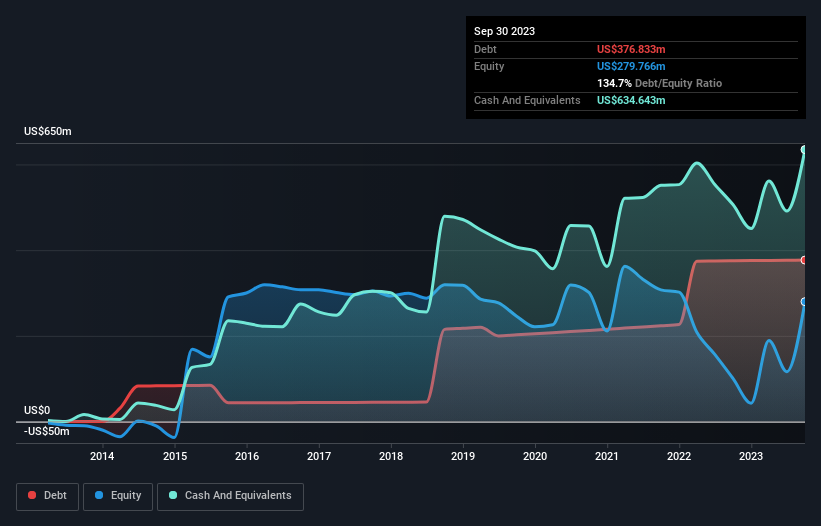- United States
- /
- Biotech
- /
- NasdaqGM:TVTX
Travere Therapeutics (NASDAQ:TVTX) May Not Be Profitable But It Seems To Be Managing Its Debt Just Fine, Anyway

Warren Buffett famously said, 'Volatility is far from synonymous with risk.' When we think about how risky a company is, we always like to look at its use of debt, since debt overload can lead to ruin. Importantly, Travere Therapeutics, Inc. (NASDAQ:TVTX) does carry debt. But should shareholders be worried about its use of debt?
When Is Debt Dangerous?
Debt assists a business until the business has trouble paying it off, either with new capital or with free cash flow. If things get really bad, the lenders can take control of the business. However, a more usual (but still expensive) situation is where a company must dilute shareholders at a cheap share price simply to get debt under control. Having said that, the most common situation is where a company manages its debt reasonably well - and to its own advantage. The first step when considering a company's debt levels is to consider its cash and debt together.
See our latest analysis for Travere Therapeutics
What Is Travere Therapeutics's Net Debt?
The chart below, which you can click on for greater detail, shows that Travere Therapeutics had US$376.8m in debt in September 2023; about the same as the year before. But on the other hand it also has US$634.6m in cash, leading to a US$257.8m net cash position.

A Look At Travere Therapeutics' Liabilities
According to the last reported balance sheet, Travere Therapeutics had liabilities of US$139.4m due within 12 months, and liabilities of US$413.7m due beyond 12 months. Offsetting these obligations, it had cash of US$634.6m as well as receivables valued at US$18.7m due within 12 months. So it can boast US$100.2m more liquid assets than total liabilities.
This excess liquidity suggests that Travere Therapeutics is taking a careful approach to debt. Because it has plenty of assets, it is unlikely to have trouble with its lenders. Simply put, the fact that Travere Therapeutics has more cash than debt is arguably a good indication that it can manage its debt safely. There's no doubt that we learn most about debt from the balance sheet. But it is future earnings, more than anything, that will determine Travere Therapeutics's ability to maintain a healthy balance sheet going forward. So if you want to see what the professionals think, you might find this free report on analyst profit forecasts to be interesting.
In the last year Travere Therapeutics wasn't profitable at an EBIT level, but managed to grow its revenue by 69%, to US$232m. Shareholders probably have their fingers crossed that it can grow its way to profits.
So How Risky Is Travere Therapeutics?
Statistically speaking companies that lose money are riskier than those that make money. And we do note that Travere Therapeutics had an earnings before interest and tax (EBIT) loss, over the last year. Indeed, in that time it burnt through US$305m of cash and made a loss of US$320m. However, it has net cash of US$257.8m, so it has a bit of time before it will need more capital. Travere Therapeutics's revenue growth shone bright over the last year, so it may well be in a position to turn a profit in due course. By investing before those profits, shareholders take on more risk in the hope of bigger rewards. When analysing debt levels, the balance sheet is the obvious place to start. But ultimately, every company can contain risks that exist outside of the balance sheet. Be aware that Travere Therapeutics is showing 3 warning signs in our investment analysis , you should know about...
If you're interested in investing in businesses that can grow profits without the burden of debt, then check out this free list of growing businesses that have net cash on the balance sheet.
Valuation is complex, but we're here to simplify it.
Discover if Travere Therapeutics might be undervalued or overvalued with our detailed analysis, featuring fair value estimates, potential risks, dividends, insider trades, and its financial condition.
Access Free AnalysisHave feedback on this article? Concerned about the content? Get in touch with us directly. Alternatively, email editorial-team (at) simplywallst.com.
This article by Simply Wall St is general in nature. We provide commentary based on historical data and analyst forecasts only using an unbiased methodology and our articles are not intended to be financial advice. It does not constitute a recommendation to buy or sell any stock, and does not take account of your objectives, or your financial situation. We aim to bring you long-term focused analysis driven by fundamental data. Note that our analysis may not factor in the latest price-sensitive company announcements or qualitative material. Simply Wall St has no position in any stocks mentioned.
About NasdaqGM:TVTX
Travere Therapeutics
A biopharmaceutical company, identifies, develops, and delivers therapies to people living with rare kidney and metabolic diseases in the United States.
Exceptional growth potential and good value.
Market Insights
Community Narratives



